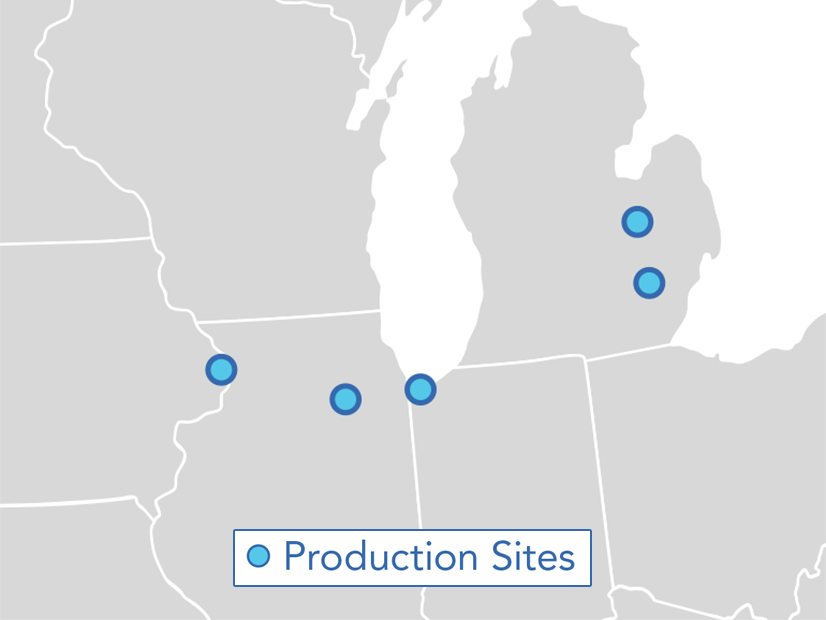
The U.S. Department of Energy has announced $2.2 billion in funding commitments to two hydrogen hubs: the HyVelocity hub on the Gulf Coast and the Midwest Alliance for Clean Hydrogen (MachH2) hub in four Midwestern states.
The Nov. 20 announcement means the DOE so far has reached funding agreements with five of the seven hydrogen hubs selected in October 2023 to receive a combined total of up to $7 billion through the Infrastructure Investment and Jobs Act. (See DOE Designates Seven Regional Hydrogen Hubs.)
The previous agreements are with the Alliance for Renewable Clean Hydrogen Energy Systems (ARCHES) hub in California; the Appalachian Regional Clean Hydrogen Hub (ARCH2); and the Pacific Northwest Hydrogen Hub (PNWH2). (See California Reaches Funding Agreement to Launch Hydrogen Hub; Pacific NW Hydrogen Hub Launched with 1st Round of Federal Funds; and Feds Launch Appalachian Hydrogen Hub.)
The two hubs still in funding negotiations with the DOE are the Heartland Hydrogen Hub in Minnesota, North Dakota and South Dakota and the Mid-Atlantic Hydrogen Hub in Pennsylvania, Delaware and New Jersey.
In the two new awards, DOE committed up to $1.2 billion to the HyVelocity hub, with an initial funding round of $22 million. The MachH2 hub will receive up to $1 billion in federal funding, including an initial allotment of $22.2 million. The initial funding will allow the hubs to launch, starting with a planning and design phase expected to last 12 to 18 months.
DOE’s Office of Clean Energy Demonstrations (OCED) will oversee development of the hydrogen hubs and decide whether to provide funding for the hubs to progress to the next stage.
Gulf Coast Hub
The HyVelocity hydrogen hub would be centered around Houston and serve the Gulf Coast region. The Gulf Coast already is the nation’s largest hydrogen producer, according to HyVelocity, which aims to be the largest hydrogen hub in the U.S.
The industry-led hub includes six core partners: AES Corp., Air Liquide, Chevron, ExxonMobil, MHI Hydrogen Infrastructure and Ørsted. As proposed, the hub would produce clean hydrogen by electrolysis of water and from natural gas coupled with carbon capture and storage. The plan also includes pipelines to connect production facilities to demand centers.
The clean hydrogen would be used for fuel cell electric trucks, industrial processes, ammonia production, refining and petrochemical production, and marine fuel, according to a project fact sheet. The total cost for Phase 1 of the Gulf Coast hub is $56 million, including the $22 million federal contribution.
Midwest Hub
The Midwest Alliance for Clean Hydrogen hub is eyeing project sites across Illinois, Indiana, Iowa and Michigan, with possible expansion into other states. The hub is in “a key U.S. industrial and transportation corridor,” according to the Alliance.
As proposed, the hub would produce more than 1,000 metric tons per day of clean hydrogen using diverse local energy sources such as renewable energy, natural gas and nuclear power, according to a project fact sheet.
“Our fleet of always-on nuclear power plants in Illinois is helping to power our economic growth with clean energy today and positions us to be a leader in the clean hydrogen future,” Illinois Gov. JB Pritzker said in a statement.
The Midwest hub consists of eight projects to be developed by nine entities: Air Liquide; BP; Constellation Energy; GTI Energy; Invenergy; Mass Transportation Authority – Flint; Michigan Department of Environment, Great Lakes and Energy; Midwest Hydrogen Corridor Coalition; and Nicor Energy Ventures (NEV).
The projects aim to decarbonize industries including heavy-duty transportation, manufacturing, steel and glass production, power generation and refining. Phase 1 of the Midwest hub will cost $51.7 million, with $22.2 million coming from the DOE.



